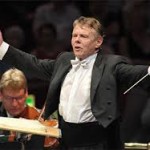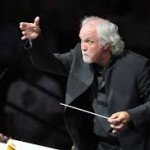Bavarian Radio Symphony Orchestra, Bavarian Radio Chorus, WDR Radio Choir, Cologne, Mariss Jansons
It is fifty years since I first heard Mahler’s Resurrection Symphony at the Proms under Leopold Stokowski and I don’t recall how full the Royal Albert Hall was then given that Mahler was not in fashion. There were certainly very few seats last night when Mariss Jansons led his Bavarian forces in a carefully controlled but compelling reading of the score. The edgy, plaintive opening gave way only fitfully to moments of solace which were quickly snuffed out and the final melt-down to the long first movement seemed to indicate that death was, after all, just a joke.
The second movement was surprisingly light, almost hesitant, in its unfolding, with touches of sentimentality before Jansons took it by the scruff of the neck and forced out any lurking hints of joy.
The third movement was full of gentle dance rhythms and brought us a headily indulgent trio, before Gerhild Romberger, singing from the midst of the orchestra, oozed her way into Urlicht, a magical moment, beautifully executed. She was joined by Genia Kuhmeier in the finale and both soared effortlessly over the enormous forces around them.
The fury of the finale was always tightly controlled, a sense that we were being encouraged to experience without indulging over-emotionally in the narrative. The hushed opening bars from the united chorus were breath-taking, like wind in the trees on a summer night, but once the movement eased towards its climax it was as if the chorus took off by themselves and there was no stopping the inevitable shattering climax.
The orchestra gave us the dynamic range of the work without the rawness which other performers often bring to it, though it never lacked excitement. The extended roar at the end was certainly justified. BH


